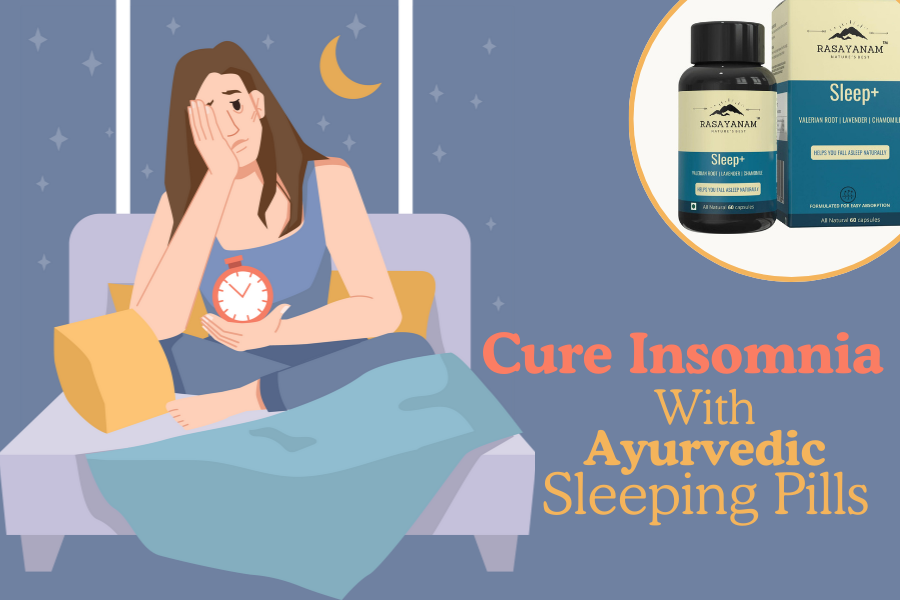By sleeping, we want to relax and unwind after a day of work and stress. Sleeping helps our brain relax; it also helps the body repair tissues, boosts the immune system, and so much more. That is why sleep is very important for every living being. Our sleep cycle has been affected by technological advancements and increased stress levels. So many people are facing sleep disorders like insomnia. Insomnia causes the patient difficulty in falling asleep. Sleeping pills are a type of medicine which are prescribed to patients suffering from insomnia and other sleep problems.
Introduction
Sleep is really important for every living being, whether humans or animals. Every living being sleeps to rest and feel rejuvenated. How much sleep one needs varies from person to person. For a healthy adult, about 7 to 9 hours is necessary.
A good quality sleep defines your physical and mental wellness. However, the level of stress and not getting a good quality of sleep has increased many problems like diabetes, heart disease, kidney disease, depression, insomnia and other sleep disorders as well.
What is Insomnia?
Insomnia is a common disorder in which you have trouble falling asleep, staying asleep, and sometimes getting a good quality sleep.
Insomnia can mess with your day-to-day schedule and mess with your brain.
Insomnia can be of two types: –
Short-term insomnia
Stress and changes in your schedules or environment cause it.
Short-term insomnia generally lasts for a few days or weeks. It can be cured by making healthy lifestyle changes and adopting a proper sleeping schedule.
Chronic or long-term insomnia
In chronic or long-term insomnia, a person can be sleepless for three or more nights a week. It can last for more than three months or more. It cannot be explained precisely as it is linked with any disease.
Once the problem arises, healthcare providers prescribe the use of sleeping pills.
What are the signs of insomnia?
Insomnia is one of the critical sleep disorders where the person is not able to sleep.
- Finding it difficult to get to sleep at night.
- Waking up in the middle of the night.
- Waking up earlier than usual.
- Being drowsy or exhausted during the day.
- Feeling irritable or nervous.
- Struggling to concentrate, pay attention, or recall things.
- Committing more mistakes or experiencing more mishaps.
- Worrying about sleep all the time.
Different Types of Sleep Disorders
Sleep disorders are states in which your sleep cycle affects sleep quality and impacts your physical and mental well-being. There are different types of sleep disorders like insomnia, restless legs syndrome(RLS), sleep apnea, and narcolepsy, as follows:-
1. Insomnia
This is a common disorder in which you have trouble falling asleep, staying asleep, and sometimes getting a good quality sleep.
2. Restless legs syndrome(RLS)
Restless legs syndrome is one of the major sleep disorders. In this type, one feels a slight urge to move one’s legs. It usually happens in the evening, at night, while sitting or lying down.

Some movement slows down the discomfort. It can begin at any age and worsens over time as one age. This will, in turn, disrupt one’s sleep cycle over time. RLS is also known as Willis-Ekbom disease.
3. Sleep apnea
One of the main sleep problems is sleep apnea, which occurs when a person’s breathing repeatedly starts and stops. The person suffering from sleep apnea snores loudly and feels tired even after sleeping for a whole night.
4. Narcolepsy
This is one of the sleep disorders in which your brain’s ability to control sleep-wake cycles. Those dealing with narcolepsy usually feel rested after waking up but then feel tired throughout the day.
The signs of narcolepsy are excessive drowsiness, hallucinations, sleep paralysis and changes in REM sleep.
How do sleeping pills help with insomnia?
Insomnia is one of the main sleep disorders in which a person is unable to sleep properly and stay asleep. When your condition worsens, your healthcare provider will monitor your sleep pattern and prescribe sleeping pills to help you fall asleep.
They are also known as hypnotics, sedatives, sleep aids, sleep medicines and tranquillisers as well.
Some common types of sleeping pills include
1. OTC pills
Antihistamines are OTC supplements (over-the-counter), as they do not require a prescription. You can buy them from any pharmacy; generally, they do not require a prescription, but you should consult your doctor before starting any medications.
2. Prescription pills
These are the types of medicines which require a proper prescription from the healthcare provider. Some of the common prescription sleeping pills include antidepressants, benzodiazepines, and Z – drugs (Ambien and Lunesta).

Sleeping Pills Side Effects
The doctor does not advise the prolonged use of sleeping pills as it can lead to dependency on these drugs with continued use. You should always consult with your doctor if you see any side effects of sleeping pills.
The following are some of the sleeping pills side effects: –
1. Short-term sleeping pills
Short-term sleeping pills’ side effects include headache, drowsiness, slow decision-making, confusion, muscle weakness, indigestion etc.
2. Long-term sleeping pills
Long-term sleeping pills’ side effects include the risk of dementia, poor memory, depression, and poor memory, leading to Alzheimer’s disease.
These pills are very addictive, and one may become dependent on them with long use. So, in that case, always insult your doctor before a proper consultation.
Ayurvedic vs Allopathic Pills: Which is best?
Natural components in ayurvedic sleeping tablets often include minerals and herbs such as ashwagandha, valerian root, and chamomile. Instead of creating reliance or unfavourable side effects, they frequently seek to encourage relaxation and enhance sleep quality.
On the other hand, pharmaceuticals known as allopathic sleeping medications frequently function by inhibiting the central nervous system to promote sleep. Although they have the potential to be beneficial, they also come with dangers of dependency, tolerance, and adverse effects, including fatigue, sleeping medicines, and cognitive impairment.
Allopathic sleeping medicines mainly target symptom management, but Ayurvedic sleeping medicines tend to focus on holistic approaches to sleep health.
Also Read: Ayurvedic tips for a healthy lifestyle.
Tips to Help You Sleep Better
To avoid dependency on these sleeping medicines, you can use these simple techniques and make some changes in your day-to-day life: –
- Try to adopt a proper sleep schedule
- Avoid the use of gadgets
- Indulge in some light breathing techniques
- Meditation to improve your sleep cycle.
- Drink warm milk.
- You can also have chamomile tea, as it helps in deep relaxation.
- You can also go for an evening walk to rewind and have a deep sleep.
Apart from that, if you still do not get enough sleep and your situation worsens, you can consult your doctor. To avoid dependency on heavy pills, you can try ayurvedic sleeping pills like Sleep+ Supplement. This is one of the best ayurvedic sleeping pills, containing natural herbs like valerian root,shunthi, Akarkara, Kesar, Pippali, Jatiphala, Chandan, Shudha Hing, and Resin Shuddha Gandhak.
Commonly Asked Questions
Q: Who Cannot take sleeping pills?
A: These pills can mess up your breathing, so it is advised that people with lung diseases like asthma and chronic lung problems should avoid them.
Q: Are sleeping pills OK to take?
A: These pills can help you fall asleep and remain asleep longer. However, they should be used sparingly to minimise the risk of developing a dependence. Consult your physician or chemist if you are experiencing difficulty falling asleep. There are also plenty of non-pharmaceutical methods to enhance your quality of sleep.
Q: How do you fix your sleeping disorder?
A: The light from TVs and other electronic devices can interfere with your sleep-wake cycle, so avoid doing either. Even on the weekends, one should go to bed and wake up at roughly the same time every day. Avoid activities that interfere with your sleep schedule, such as working nights or fluctuating schedules.
Q: What are the five most common sleep disorders?
A: Insomnia, restless legs syndrome(RLS), sleep apnea, parasomnia and narcolepsy.
Conclusion
We want to unwind and relax as we sleep after a demanding and stressful day at work. Sleeping strengthens the immune system, helps the body heal itself, and also relaxes the brain. For this reason, sleep is crucial for all living things.
Stress levels and technological improvements have an impact on our sleep patterns. A great deal of people struggle with sleep issues like insomnia. One kind of sleep disturbance is insomnia, which is characterised by difficulty falling asleep.
Patients dealing with insomnia and other sleep disorders are administered a certain kind of medication called sleeping pills.
Disclaimer: This write-up intends to provide general information and should not be considered professional advice. Kindly consult your healthcare professional for accurate dosage and modifications.
References :
https://www.webmd.com/sleep-disorders/sleep-requirements
https://www.mayoclinic.org/diseases-conditions/insomnia/symptoms-causes/syc-20355167
https://my.clevelandclinic.org/health/drugs/15308-sleeping-pills





